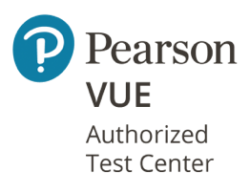Course Details
Topic 1: Introduction Hydroponic Urban Farming and Disease Management
- Introduction to hydroponics urban farming
- Overview of hydroponics systems
- Recognise characteristics of soil and media
- Recognise watering needs of crops
- Recognise pests, plant diseases and invasive species to determine remediation measures
- Implement treatment for pests, diseases and invasive species to maintain plant health
Topic 2: Plant Nutrition for Hydroponics Urban Farming
- Understand current plant nutrition managment through guided hydroponics farm tour
- Identify plant nutritional deficiencies to appraise nutriation requirements
- Implement media management plan to ensure optimal growing conditions
- Developing quarantine policy and control measured for infestation
Topic 3: Implement an Plant Health Management Program for Hydroponics
- Prepare and calibrate tools and equipment to ensure adequate amount of water and nutrients delivered
- Practice tools and equipment using desktop hydroponics kit
- Adopt suitable growing media for improved plant health
- Introduction to Indoor hydroponics urban farming
- Introduction to aquaponics urban farming
- Minimize environmental impact of hydroponics urban farming
Topic 4: Safety Compliance for Urban Farming
- Workplace safety and health (WSH) guidelines for urban farming
- Adhere to WSH guidelines, standards and practices in Singapore agritech sector
Final Assessment
- Written Assessment - Short Answer Questions (WA-SAQ)
- Case Study (CS)
Guided Farm Tour
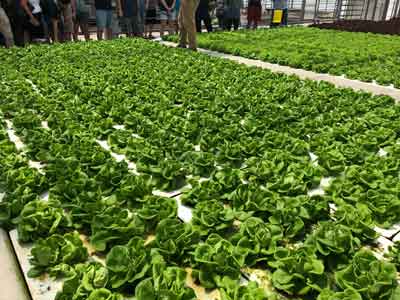
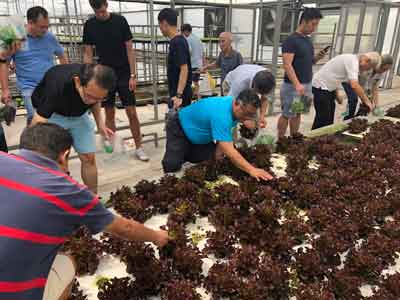
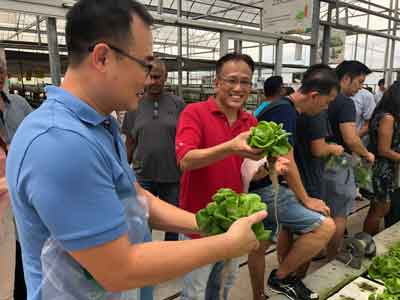
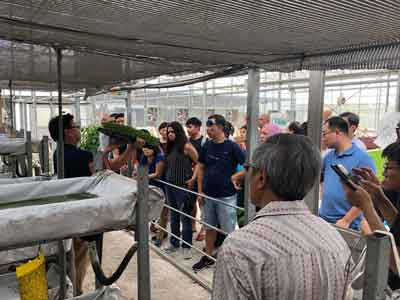
Course Info
Promotion Code
Promo or discount cannot be applied to WSQ courses
Minimum Entry Requirement
- Primary school education and above or be able to speak, listen and read English and read numbers at a proficiency level not lower than the Employability Skills Workforce Skills Qualification Workplace Literacy and Numeracy Level (WPLN Level 3).
- Ordinarily, the learners should be able to comprehend diagrams and the recurring simple phrases in a camera manual.
- Able to lift and hold farming tools such as a spade.
Target age group: 21 - 65 years old
Minimum Software/Hardware Requirement
Software: NIL
Hardware: Windows and Mac Laptops
About Progressive Wage Model (PWM)
The Progressive Wage Model (PWM) helps to increase wages of workers through upgrading skills and improving productivity.
Employers must ensure that their Singapore citizen and PR workers meet the PWM training requirements of attaining at least 1 Workforce Skills Qualification (WSQ) Statement of Attainment, out of the list of approved WSQ training modules.
For more information on PWM, please visit MOM site.
Funding Eligility Criteria
| Individual Sponsored Trainee | Employer Sponsored Trainee |
|
|
|
SkillsFuture Credit:
PSEA:
|
Absentee Payroll (AP) Funding:
SFEC:
|
Steps to Apply Skills Future Claim
- The staff will send you an invoice with the fee breakdown.
- Login to the MySkillsFuture portal, select the course you’re enrolling on and enter the course date and schedule.
- Enter the course fee payable by you (including GST) and enter the amount of credit to claim.
- Upload your invoice and click ‘Submit’
SkillsFuture Level-Up Program
The SkillsFuture Level-Up Programme provides greater structural support for mid-career Singaporeans aged 40 years and above to pursue a substantive skills reboot and stay relevant in a changing economy. For more information, visit SkillsFuture Level-Up Programme
Get Additional Course Fee Support Up to $500 under UTAP
The Union Training Assistance Programme (UTAP) is a training benefit provided to NTUC Union Members with an objective of encouraging them to upgrade with skills training. It is provided to minimize the training cost. If you are a NTUC Union Member then you can get 50% funding (capped at $500 per year) under Union Training Assistance Programme (UTAP).
For more information visit NTUC U Portal – Union Training Assistance Program (UTAP)
Steps to Apply UTAP
- Log in to your U Portal account to submit your UTAP application upon completion of the course.
Note
- SSG subsidy is available for Singapore Citizens, Permanent Residents, and Corporates.
- All Singaporeans aged 25 and above can use their SkillsFuture Credit to pay. For more details, visit www.skillsfuture.gov.sg/credit
- An unfunded course fee can be claimed via SkillsFuture Credit or paid in cash.
- UTAP funding for NTUC Union Members is capped at $250 for 39 years and below and at $500 for 40 years and above.
- UTAP support amount will be paid to training provider first and claimed after end of class by learner.
Job Roles
- Urban Farm Manager
- Hydroponics Technician
- Aquaponics Specialist
- Sustainable Agriculture Consultant
- Plant Health Inspector
- Environmental Impact Analyst
- Urban Farming Educator
- Pest Management Specialist
- Plant Nutritionist
- Agricultural Compliance Officer
- Research Scientist in Urban Farming
- Greenhouse Operations Manager
- Sustainable Farming Advocate
- Horticulture Specialist
- Community Garden Coordinator
- Urban Agriculture Policy Maker
- Food Security Analyst
- Vertical Farming Technician
- Organic Farming Consultant
- Agricultural Extension Officer
Trainers
Felicia Kang: Felicia Kang is a ACTA certified trainer. Felicia is a urban farmer maintaining a few EGC's edible gardens, namely Wheelock Place rooftop garden, Raffles City rooftop garden, garden at Open Farm Community and EGC retail outlet at HortPark. Her daily work involved watering, pruning and checking on plants. She had to tend to the nursery from saving and growing seeds, to propagating stems and transplanting plants. She also needs to take regular measures such as pest control, application of fertilizers and soil amendments to ensure those edible plants were sustainable for weekly harvesting. All these might seem trivial but they were vital to ensure healthy soil and happy plants. On adhoc basis, she maintained clients' edible gardens and assisted in setting up foodscape projects. With her farming experience, she was tasked to support the education arm of EGC in planning and coordinating with schools and EGC trainers for schools' gardening workshops and projects.
She said that "Farming or gardening is more than just growing plants, it hones our observation skill, trains our patience and resilience, and improves our physical and mental health. Last but not least, it lets us enjoy and share our labour of love."



